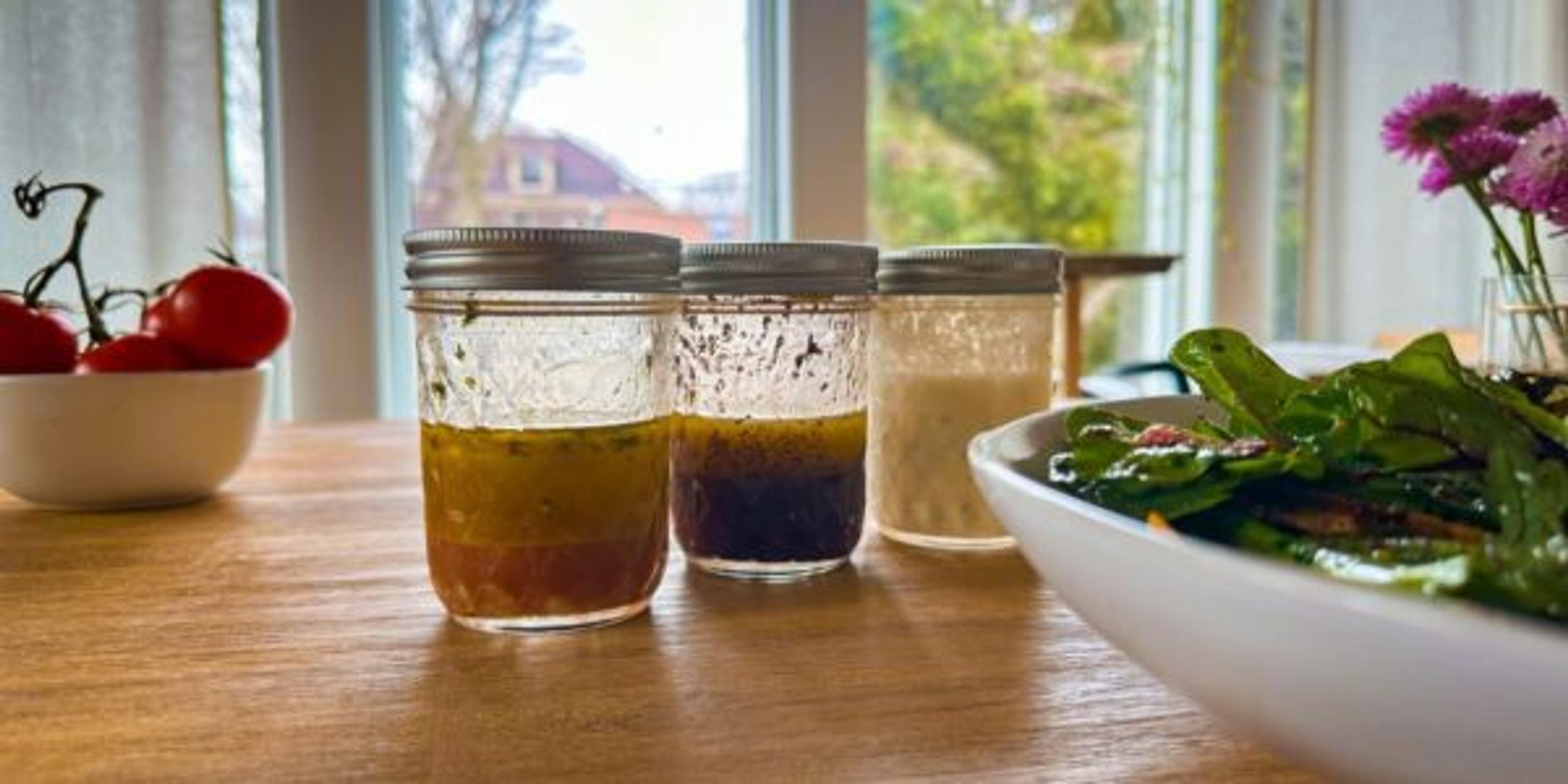Spring Salad Essentials with 3 Mason Jar Salad Dressings

Shanthi Appelo, MS, RD
| 3 min read

As spring arrives, it’s the perfect time to take advantage of seasonal produce. One of the most versatile and nutrient-dense options is salad greens. Unfortunately, many Americans don’t consume enough fruits and vegetables, which means they’re missing out on important nutrients. According to The Centers for Disease Control and Prevention, only 1 in 10 Americans eats the recommended amount of fruits and vegetables. Fortunately, there are plenty of ways to spice up your salad. Follow along for tips and three mason jar salad dressing recipes.
Benefits of salad greens
Salad greens are an excellent source of fiber, which is essential for maintaining healthy digestion and preventing chronic diseases like Type 2 diabetes and heart disease. They’re packed with phytonutrients, which are plant compounds that have powerful antioxidant and anti-inflammatory properties. These compounds have been linked to a reduced risk of cancer and other chronic diseases.
Types of greens
There are many types of salad greens available, each with its own unique flavor and texture.
- Arugula has a peppery flavor and is rich in vitamin C and potassium. Arugula tastes excellent with lemon juice, olive oil, thinly sliced pears and shaved parmesan.
- Spinach has a mild flavor and is high in iron and vitamin K. Pair it with fresh sliced strawberries, feta, walnuts and a fruity vinaigrette.
- Kale has a slightly bitter flavor and is loaded with vitamins A, C, and K. Giving the kale a gentle massage with olive oil and lemon juice for 20 seconds helps it taste its best. Try kale in place of romaine for a heartier Caesar salad.
- Romaine has a crisp texture and is a good source of folate and vitamin A. Thinly shred it along with bell peppers, sliced tomatoes, parmesan, banana peppers and Italian vinaigrette for a refreshing salad.
- Mixed greens are a combination of different greens that provide a variety of nutrients and flavors.
Protein options
Adding protein to your salad is a great way to make it more filling and satisfying. Some excellent options include:
- Grilled chicken – A lean source of protein that combines easily with any salad
- Hard-boiled eggs – A great source of protein that’s easy to prepare.
- Tofu – A vegetarian option that’s high in protein and low in calories
- Nuts and seeds – Provide healthy fats, fiber and protein
- Beans – A good source of plant-based protein and fiber
Toppings
Toppings add delicious flair to your salad. Here are some delicious and healthy options:
- Vegetables add crunch and flavor to your salad while also providing important nutrients. Think outside the box with veggies like jicama and artichokes.
- Fruits are a great way to add sweetness and color to your salad. Aim for fresh fruit like pomegranate seeds over dried, which are dense in sugar and often have added sugar.
- Cheese adds a rich flavor and is a source of calcium. As cheese is high in saturated fat, keep the serving size to 1 ounce.
- Herbs add a burst of flavor and antioxidants. Chopped cilantro, parsley and basil are great additions.
Dressings
Dressing can make or break your salad. Here are some healthy options to shake up in a Mason jar:
Serving Amount
Ingredients
1⁄2 cup olive oil
1⁄4 cup red wine vinegar
1 garlic clove, pressed or finely minced
1 tsp dried oregano, parsley or basil
1 tsp honey
1 tsp Dijon mustard
Salt and pepper to taste
Instructions
Step 1
Add all ingredients to a Mason jar and shake.
Serving Amount
Ingredients
Instructions
Serving Amount
Ingredients
1 cup Greek yogurt
1 tbsp olive oil
2 tsp dried parsley
1 tsp garlic powder
1 tsp onion powder
2 tbsp lemon juice
Up to ¼ cup milk
Salt and pepper to taste





